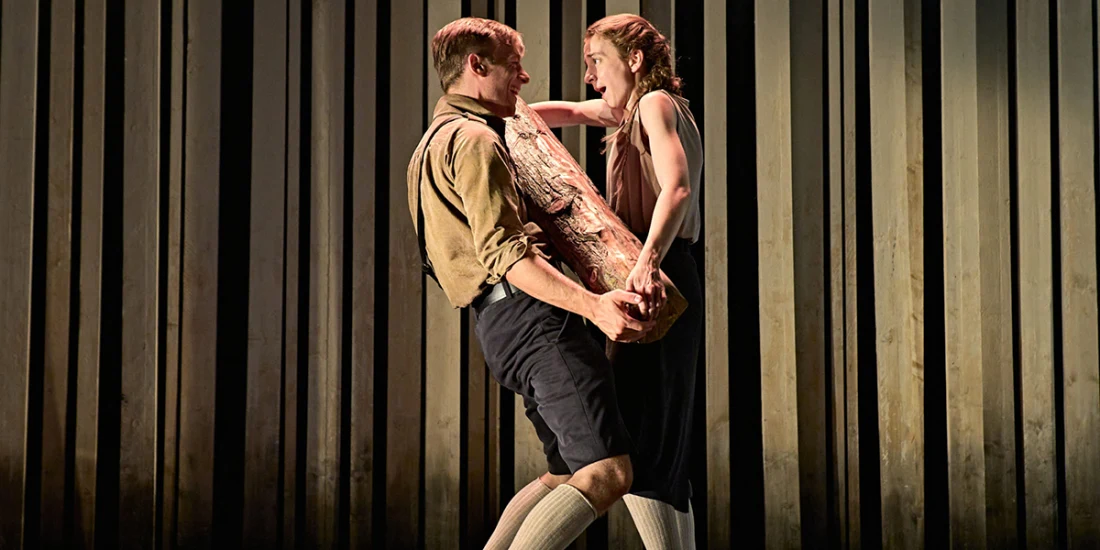'Camp Siegfried' review - a compelling, crackling drama heightened by modern politics
Who knew there was a Nazi summer camp on New York's Long Island in the 1930s? While renting a house there during the pandemic, American playwright Bess Wohl began reading about Camp Siegfried in the town of Yaphank, where kids marched down Hitler Street and flower beds were planted like swastikas. In fact, it was one of several such camps in the U.S., fascism and hatred gathering force in plain sight.
What a compelling premise for drama, and Wohl takes the astute decision to make this an intimate two-hander. It's that familiar tale of girl meets boy, a transformative summer romance, but instead of, say, learning to ballroom dance and carry a watermelon, it's a programme of indoctrination and pure-blood breeding.
We're in 1938, and it's the first time at camp for the character known simply as Her, aged 16. She lives in Baltimore and has come at the behest of her aunt; her family wants her to be more outdoorsy. The boy, Him, is just a year older, but a shining example of golden Hitler Youth: preaching camp spirit and Germanic pride while chopping wood with macho, groin-thrusting athleticism.
Yet more connects them that they initially realise - and leaves them dangerously vulnerable to such extremist ideology. Both feel like outsiders, belittled by parents and classmates, anxious to belong. She becomes a zealous student, absorbing Hitler's speeches about revolutionary change alongside her vocabulary lessons, while he embraces their relationship as the key to winning approval.
Wohl keeps a tight focus on the pair, so that the wider implications only gradually become clear. At first, we're just watching a funny, sweetly awkward adolescent courtship. Yet Luke Thallon is heartbreaking as his character, on the surface so assured, begins to open up to her and express his fear that there's an inescapable darkness inside of him, exacerbated by the pressure put on men to appear strong.
The mesmeric Patsy Ferran adeptly builds up a fascinating, complex portrait of a girl with a feverish mind who is too knowing in some ways (including a fling with an older man) and achingly naïve in others. There's a strain of self-loathing, even self-harm, born from pre-empting others' criticism.
But finding her place within the camp, aided by this boy, gives her a kind of rebirth. And she's hungry for it. While watching him splitting wood, she flinches at the violence of the action, yet is transfixed. There's an ecstasy to her discoveries; she even uses a Hitler passage as foreplay. By the time she's making a scorching anti-Semitic speech, buzzed on adrenaline, she's miles from where she started, but we can see the exact path she has trodden.
Worse than that: we've trodden it with her. Katy Rudd's production cleverly uses the show as a parallel seduction to the camp's radicalisation, theatrical trappings twisting our sympathies. Wohl's message, lent a terrible urgency by our current political landscape, comes blazing through: we must not sleepwalk into this again.
Rosanna Vize's stylistic set features a backdrop of slats, suggesting the camp's woods, while Ian Dickinson's sound design and Rob Casey's lighting deliberately flood our senses.
However, it would all work better in a smaller space; there's a battle here to create the right sense of claustrophobia in the Old Vic. Wohl's play also can't quite stick the landing: the writing becomes too blunt and contrived. But this is still a riveting piece, crackling with menace.
Camp Siegfried is at the Old Vic to 30 October.
Photo credit: Luke Thallon and Patsy Ferran (Photo by Manuel Harlan)
Originally published on
